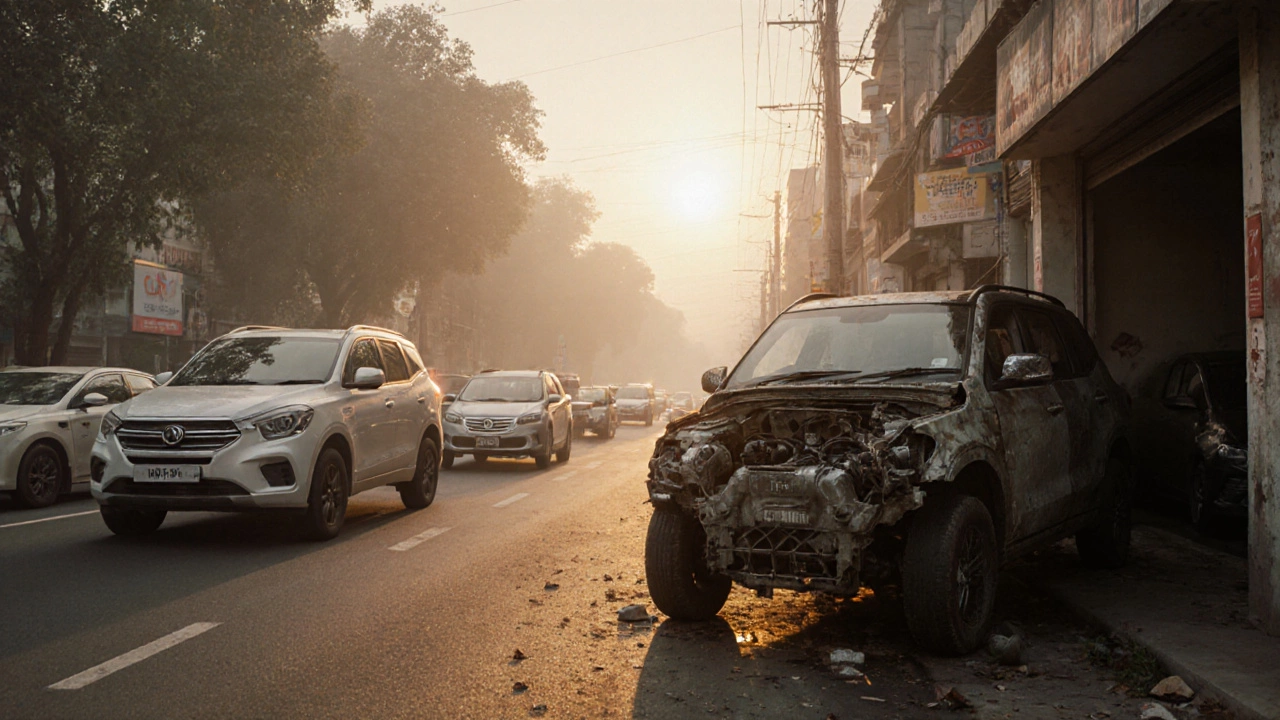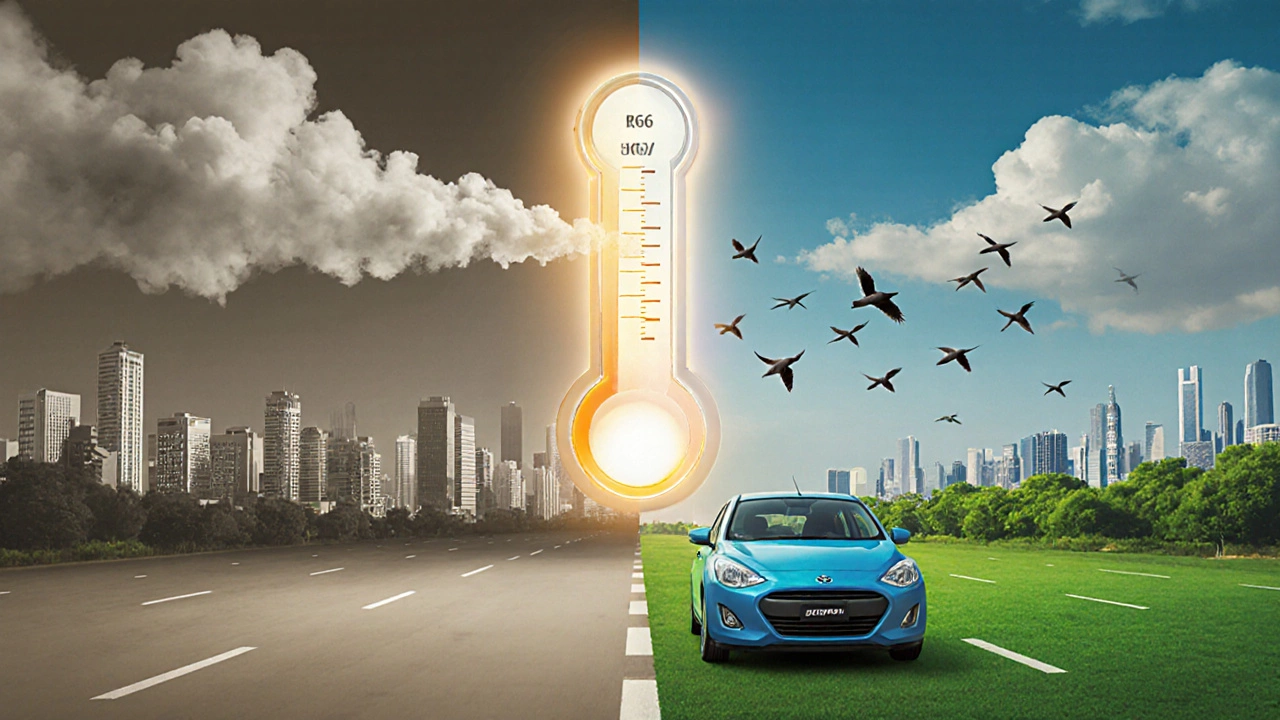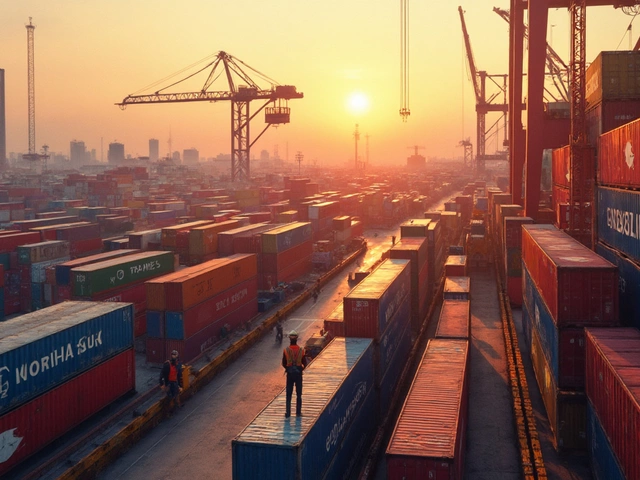
BS6 Emission Compliance Checker
Check Your Vehicle's BS6 Compliance
India's BS6 emission standards banned non-compliant engines starting April 2020. Find out if your vehicle meets requirements for legal registration and road use in 2025.
Enter your vehicle details to see if it meets BS6 standards for 2025.
India doesn’t ban engines the way you might think-no official list says "Engine X is forbidden." But if you’re trying to buy or import a vehicle with an older engine, you’re already hitting a wall. The real answer isn’t about a single engine model. It’s about emission standards. Since April 2020, India has enforced Bharat Stage VI (BS6) norms across the country. Any engine that doesn’t meet BS6 is effectively banned from sale, registration, or road use. That means older diesel engines, especially those from before 2017, are no longer legal for new vehicles.
What Changed in 2020?
Before 2020, India used BS4 emission standards. Those rules allowed higher levels of nitrogen oxides (NOx) and particulate matter-two major pollutants linked to smog and respiratory illness. In 2017, the government skipped BS5 entirely and jumped straight to BS6, matching European standards. The move was abrupt, but necessary. Cities like Delhi, Mumbai, and Kolkata were choking. A 2019 study by the Central Pollution Control Board found that vehicles contributed over 30% of urban air pollution in major cities.
BS6 engines cut NOx emissions by 70% in diesel vehicles and 25% in petrol ones. Particulate matter from diesel engines dropped by 80%. To meet this, manufacturers had to add new tech: Selective Catalytic Reduction (SCR), Diesel Particulate Filters (DPF), and advanced fuel injection systems. The cost went up. The complexity went up. But the air got cleaner.
Which Engines Are Actually Banned?
It’s not one engine. It’s entire families. Here’s what’s no longer allowed on Indian roads after April 2020:
- Any diesel engine without a DPF and SCR system
- Older 4-cylinder diesel engines like the 2.2L Ford Duratorq (pre-BS6)
- 3-cylinder diesel engines such as the 1.3L Multijet used in older Maruti Suzuki models
- Carbureted petrol engines (already phased out earlier, but still common in vintage bikes and scooters)
- Any engine not certified by the Automotive Research Association of India (ARAI) for BS6 compliance
Even if a vehicle was registered before 2020, you can still drive it. The ban applies only to new sales and registrations. But if you try to transfer ownership after 2020 and the engine doesn’t meet BS6, the Regional Transport Office (RTO) will refuse the paperwork. That’s how the ban is enforced-not by police pulling over old cars, but by blocking paperwork at the source.
Why Did India Skip BS5?
Most countries upgrade emission standards every 5-7 years. India went from BS4 to BS6 in just three. Why? Because pollution was getting worse faster than the rules could catch up. The World Health Organization ranked Delhi as the world’s most polluted capital in 2018 and 2019. The government realized waiting for BS5 would mean another decade of dirty air.
Also, global automakers were already producing BS6 engines for Europe and other markets. It made economic sense to skip a step. Maruti Suzuki, Hyundai, Tata, and Mahindra all redesigned their engines in under two years. Some models, like the Maruti Swift and Hyundai i20, switched from BS4 to BS6 without changing their engine size-just the tech inside.

What About Used Cars and Imports?
Used cars from other countries can’t just be shipped in. India’s import rules now require BS6 compliance even for used vehicles. That’s why you rarely see European diesel SUVs on Indian roads anymore. Even if they’re newer, they’re rejected if they don’t have Indian-certified emission controls.
As for used Indian cars with older engines-they’re still legal to own and drive. But resale value has dropped sharply. A 2018 diesel Swift might sell for 20% less than its BS6 equivalent. Buyers know the engine won’t pass future inspections, and maintenance costs are rising as parts become scarce.
What Happens If You Try to Use a Non-BS6 Engine?
You can’t legally buy one. Dealerships don’t stock them. Online marketplaces like OLX and CarDekho flag non-BS6 vehicles with warnings. Insurance companies won’t renew policies for non-compliant vehicles if they’re being re-registered. And if you’re caught modifying a vehicle to bypass emissions controls-like removing a DPF-you could face fines under the Motor Vehicles Act, 2019.
In 2023, the Ministry of Road Transport and Highways fined over 12,000 workshops for tampering with emission systems. Many of these were diesel tuning shops in cities like Jaipur and Ahmedabad that were selling "performance kits" that disabled DPFs. The government now uses remote emission sensors at major highways to detect non-compliant vehicles.

Are There Any Exceptions?
Yes-but very few. Vintage vehicles over 30 years old are exempt from BS6 rules. They can still be driven, but only on private roads or during approved vintage car events. Military vehicles and emergency service vehicles (like ambulances) are also exempt, but even those are now being retrofitted with BS6-compliant engines where possible.
There’s no exception for farmers, fishermen, or small businesses. Even tractors and agricultural equipment must now meet BS6 standards. The government introduced BS6-compliant tractor engines in 2022, and by 2024, all new tractors sold in India had to comply.
What Does This Mean for Buyers Today?
If you’re shopping for a new car in 2025, you have no choice. Every new vehicle sold in India is BS6-compliant. The question isn’t whether the engine is banned-it’s whether you want petrol or diesel. Diesel is still available, but it’s more expensive to maintain. The DPF and SCR systems need regular cleaning and can cost ₹15,000-₹40,000 to replace if they clog.
Most buyers now choose petrol or CNG. Petrol engines are simpler, cheaper to fix, and just as powerful for daily driving. CNG is the smartest choice for city commuters-fuel costs are 60% lower than diesel, and emissions are near zero. Tata, Maruti, and Hyundai all offer factory-fitted CNG options.
What’s Next After BS6?
India is already looking ahead. The government has started testing BS6 Phase 2 norms, which will require even stricter NOx limits and real-world driving emissions testing. By 2027, all new vehicles may need to include onboard emission monitoring systems-similar to the OBD-II systems in the U.S.
Electric vehicles are also accelerating. The FAME II subsidy program has pushed EV sales to over 1.5 million units in 2024. The goal is for 30% of all new vehicle sales to be electric by 2030. That means internal combustion engines, even BS6 ones, are on borrowed time.
So while no single engine is "banned" by name, the truth is simple: if your engine doesn’t meet BS6 standards, it can’t legally be sold or registered in India. The ban isn’t about the engine-it’s about the air we breathe.
Is it legal to drive a pre-BS6 diesel car in India?
Yes, you can still drive a pre-BS6 diesel car if it was registered before April 2020. The ban only applies to new sales and registrations. However, resale value has dropped, and you may face difficulties during ownership transfer or insurance renewal. Some cities like Delhi have additional restrictions on older diesel vehicles during high-pollution seasons.
Can I import a used diesel car from Europe to India?
No. India requires all imported vehicles-new or used-to meet BS6 emission standards. Even if the car is brand new in Europe, if it doesn’t have ARAI-certified BS6 emissions controls, it will be rejected at customs. This rule applies to all personal imports, including those brought by returning NRIs.
Are BS6 engines more expensive to maintain?
Yes, especially diesel BS6 engines. They include complex components like Diesel Particulate Filters (DPF) and Selective Catalytic Reduction (SCR) systems. DPFs can clog if the car is driven mostly on short trips, requiring expensive cleaning or replacement-costing between ₹15,000 and ₹40,000. Petrol BS6 engines are simpler and cheaper to maintain.
What happens if I remove the DPF from my BS6 diesel car?
Removing or tampering with the DPF or SCR system is illegal under the Motor Vehicles Act, 2019. If caught, you could face fines up to ₹10,000 and possible cancellation of your vehicle registration. Many cities now use roadside emission sensors that detect non-compliant vehicles. Mechanics who perform these modifications are also being fined and shut down.
Will BS6 engines be banned in the future?
Not directly, but they’re being phased out. India’s goal is to have 30% of all new vehicle sales be electric by 2030. BS6 engines are the last generation of internal combustion engines allowed in India. Future regulations will likely make them less practical through higher taxes, restricted city access, or mandatory retrofitting. They won’t be banned overnight, but their days are numbered.




